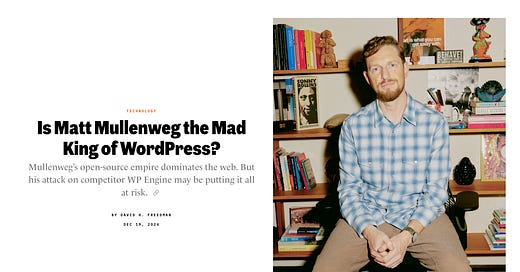Matt Mullenweg vs Inc. Magazine
Inc. magazine published a story on Matt Mullenweg VS WP Engine, Matt fight back calling it a hit piece
The WordPress community finds itself at a crossroads as a bitter dispute between Matt Mullenweg and WP Engine unfolds. What began as tensions over trademark rights and open-source contributions has escalated into legal battles and public accusations, leaving many wondering about the future of the platform that powers 43% of the web.
The Inc Magazine Story
Last week, Inc Magazine published an extensive profile of Matt Mullenweg, painting a picture of a leader whose control over WordPress has become increasingly controversial. The piece, written by David H. Freedman, details how in September, Mullenweg temporarily blocked WP Engine's access to WordPress.org resources, affecting their customers' ability to perform automatic updates.
The article portrays Mullenweg as someone whose leadership style has shifted from "benevolent dictator" to what some now view as more authoritarian control. It highlights his ownership of WordPress.org and his role in the WordPress Foundation, suggesting these give him outsized influence over the ecosystem.
Mullenweg Responds
However, there's another side to this story. In a detailed blog post responding to the Inc piece, Mullenweg challenges numerous aspects of the reporting, pointing out what he claims are factual errors and mischaracterizations. He disputes Inc's valuation figures, clarifies the WordPress Foundation's structure, and provides context for decisions that the magazine portrayed as arbitrary or vindictive.
Key points of contention include:
- The true nature of the trademark dispute with WP Engine
- The actual number of affected websites (roughly 745,000 rather than 1.5 million)
- The WordPress Foundation's governance structure
- The historical context of previous WordPress controversies
What This Means for the Community
This situation raises important questions about power dynamics in open-source software. While WordPress's success has been built on community contribution and open collaboration, the current dispute highlights the complex relationship between commercial interests and open-source principles.
For WordPress users and developers, several practical considerations emerge:
- The stability of the WordPress ecosystem
- The relationship between commercial hosting providers and core WordPress resources
- The future of trademark enforcement in the WordPress space
- The balance between centralized leadership and community governance
Looking Forward
Despite the controversy, WordPress continues to grow its market share. The platform's fundamentals remain strong, though this situation may lead to meaningful discussions about governance and the relationship between commercial entities and open-source projects.
The outcome of WP Engine's lawsuit and any resulting changes to WordPress's governance structure could reshape how open-source projects handle similar situations in the future. As this story develops, we'll continue to monitor its implications for the broader WordPress community.
---
WPMore team.
Your thoughts? Share them with us in the comments below.





